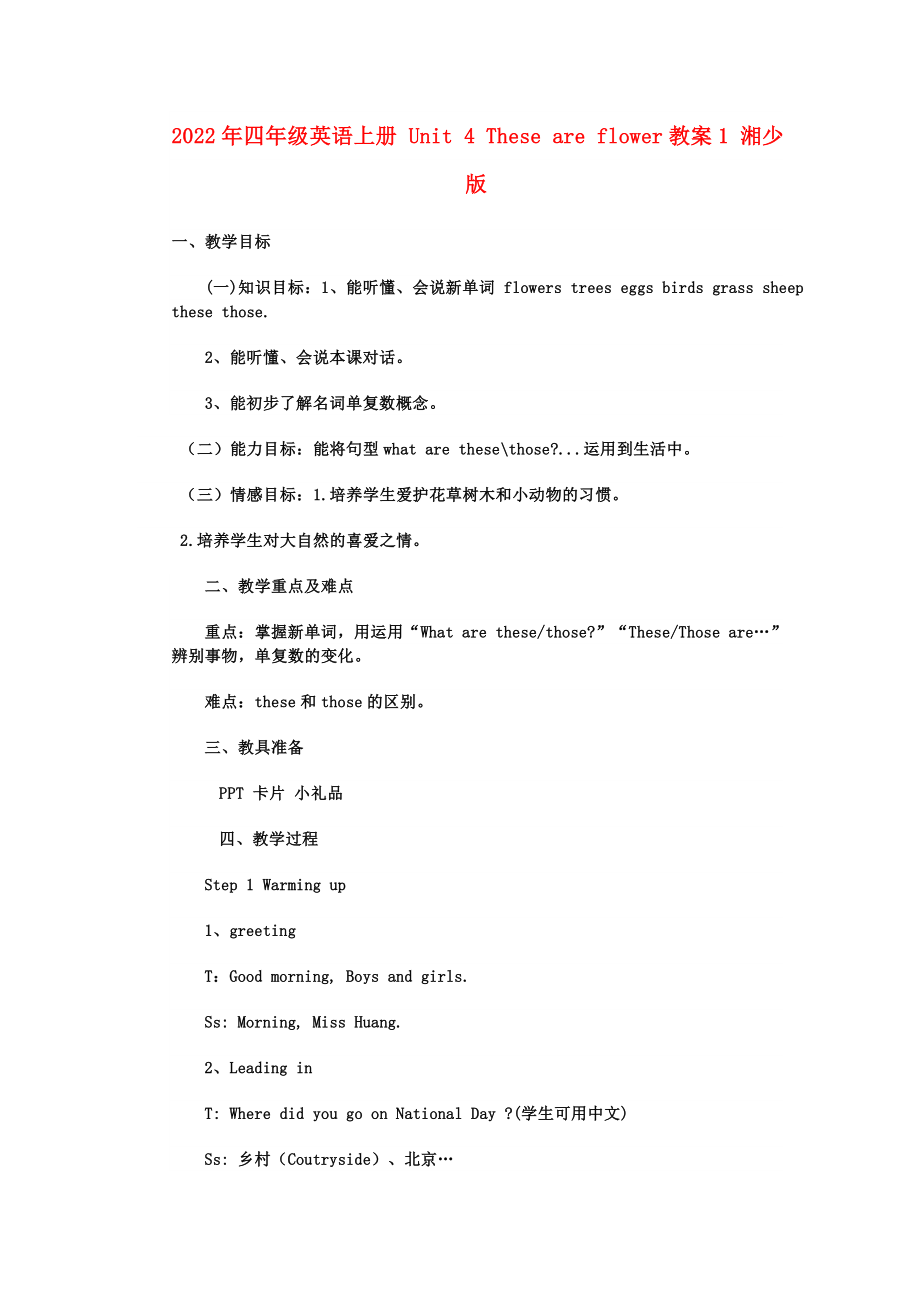《2022年四年級(jí)英語上冊 Unit 4 These are flower教案1 湘少版》由會(huì)員分享��,可在線閱讀��,更多相關(guān)《2022年四年級(jí)英語上冊 Unit 4 These are flower教案1 湘少版(3頁珍藏版)》請?jiān)谘b配圖網(wǎng)上搜索��。
1��、2022年四年級(jí)英語上冊 Unit 4 These are flower教案1 湘少版
一��、教學(xué)目標(biāo)
(一)知識(shí)目標(biāo):1��、能聽懂��、會(huì)說新單詞 flowers trees eggs birds grass sheep these those.
2��、能聽懂��、會(huì)說本課對話��。
3��、能初步了解名詞單復(fù)數(shù)概念��。
(二)能力目標(biāo):能將句型what are these\those?...運(yùn)用到生活中��。
(三)情感目標(biāo):1.培養(yǎng)學(xué)生愛護(hù)花草樹木和小動(dòng)物的習(xí)慣��。
2.培養(yǎng)學(xué)生對大自然的喜愛之情��。
二��、教學(xué)重點(diǎn)及難點(diǎn)
重點(diǎn):掌握新單詞��,用運(yùn)用“What are these/those?”“
2��、These/Those are…”辨別事物��,單復(fù)數(shù)的變化��。
難點(diǎn):these和those的區(qū)別��。
三、教具準(zhǔn)備
PPT 卡片 小禮品
四��、教學(xué)過程
Step 1 Warming up
1��、greeting
T:Good morning, Boys and girls.
Ss: Morning, Miss Huang.
2��、Leading in
T: Where did you go on National Day ?(學(xué)生可用中文)
Ss: 鄉(xiāng)村(Coutryside)��、北京…
T:Do you want to know where
3��、have I been?I have gone on an outing and I saw many things in nature.(出示大自然的圖��,一一播放新單詞對應(yīng)的事物)��。
What is this?
Ss: 花朵(Flowers).
T:flower (a flower)
一張有兩朵花\三朵花的幻燈片
T:two flowers\three flowers
一張花海的幻燈片
T:flowers
T:What is this?
Ss:樹(tree)也同樣以教花朵的方式呈現(xiàn)
T:What can we see in this tree?
Ss:birds
4��、 (a bird—two birds –three birds …)
T:What does birds lay?(a egg---two eggs---eggs)
教導(dǎo)學(xué)生不要碰鳥蛋
T:Let’s see another picture.what can you see?
Ss:羊
T:sheep(a sheep \two sheep ).what does sheep eat?
Ss:草(grass)
將單數(shù)單詞和對應(yīng)物圖片呈現(xiàn)��、帶讀(左)��。再講所對應(yīng)的復(fù)數(shù)和圖片(右)��。加深學(xué)生對復(fù)數(shù)的理解��。
These 和those 的處理(采用幻燈片)
T:We have
5��、watched many so many beautiful pictures ,do you want to go for an outing with the children in our books? Let’s go!
播放課文視頻(Part A)
What do you see in this vedio?
S1:flowers
S2:eggs
S3:birds
….
T:Could you tell me what happened?
S4:一群孩子在郊游��,他們看到了美麗的花…
一��、T:Wonderful. Look at picture1. Read aft
6��、er me :The children are on an outing .將句子帶讀一遍��,選出較難單詞帶讀��,翻譯單詞��、句子��。
二��、T:What does Mingming say in picture 2?
Ss:These are flowers.(帶讀��、翻譯)
T:How about Lingling?
S5:Yes.They are beautiful.(帶讀��、翻譯)
三��、T:用鼠標(biāo)指著綠色的鳥問 what are those? 以此引出下一個(gè)句子��。
Can we shoot them?(教育孩子們保護(hù)生物)
四��、T:Look at picture 4, how many
7��、 eggs are there?
Ss:two eggs.
T:Those are eggs,right?
Ss:yes
T:They are hen’s eggs or bird’s eggs?
Ss: They are bird’s eggs.
帶讀��、解釋名詞所有格birds’ eggs(鳥的蛋) hens’ eggs(雞的蛋) 加入hens’ eggs是學(xué)生更深的理解名詞所有格
T:What is the difference between birds’ eggs and bird’s eggs?
….
Can we touch the eggs?
Ss:No ,we can’t.
T:So we can say “Don’t touch them.”
Practice
跟音頻讀3遍課文后��,老師與一個(gè)同學(xué)進(jìn)行示范表演��,一個(gè)扮演明明��,一個(gè)扮演玲玲��。
請同學(xué)們熟讀課文與同桌進(jìn)行合作��,表演時(shí)老師讀第一副圖的內(nèi)容��。
最后小組競賽(按照平時(shí)的四人一組��,第一副圖的內(nèi)容四個(gè)人讀)��,此活動(dòng)在講臺(tái)上完成��,老師會(huì)發(fā)小紅旗��。
Consolidation
回顧所學(xué)內(nèi)容
強(qiáng)調(diào)愛護(hù)大自然��,保護(hù)小動(dòng)物
Homework
熟背課文��、抄寫B(tài)部分的單詞(每個(gè)一行��,每行6個(gè))
 2022年四年級(jí)英語上冊 Unit 4 These are flower教案1 湘少版
2022年四年級(jí)英語上冊 Unit 4 These are flower教案1 湘少版

